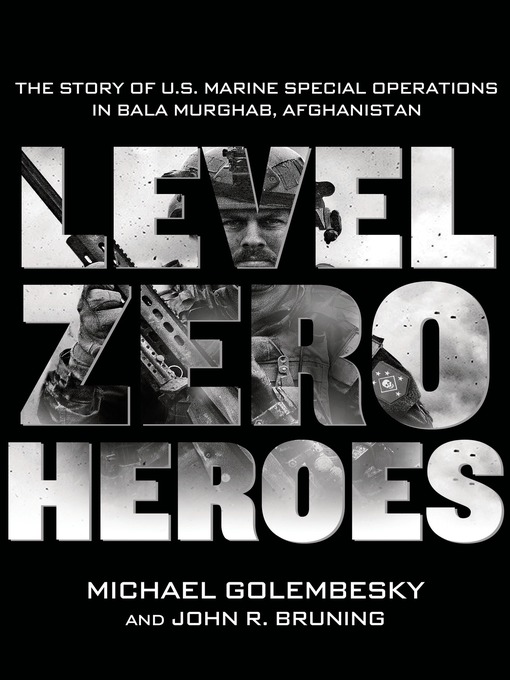
Level Zero Heroes
The Story of U.S. Marine Special Operations in Bala Murghab, Afghanistan
کتاب های مرتبط
- اطلاعات
- نقد و بررسی
- دیدگاه کاربران
نقد و بررسی

July 7, 2014
Former U.S. Marine Michael “Ski” Golembesky tells the engaging story of his unit, Special Operations Team 8222, in action on the ground in Afghanistan from October to December of 2009 and while it’s not quite military propaganda, it certainly paints an overwhelmingly positive portrait of the U.S. Marines. Golembesky kept a journal in Afghanistan and he wrote this book “as a sort of catharsis.” But his project soon evolved into a mission to showcase the wartime service of his fellow Marines in Afghanistan. To do so, he focuses on a mission in which his 23-member special-ops team (call sign Dagger 22), operating out of Forward Operating Base Todd in the mountainous Bala Murghab River Valley in northwest Afghanistan, went after an entrenched Taliban stronghold. Golembesky vividly depicts the engagement, which became known as Operation Hero Recovery and involved vicious ground combat. There are military acronyms galore and plenty of reconstructed dialogue in this paean to the Marines on the ground doing the grunt work in America’s longest armed conflict. But Golembesky’s condemnation of the “rules with which our nation’s leaders have decided to fight the war in Afghanistan” will prove controversial.

August 15, 2014
Grim account of wearying combat in Afghanistan by a Marine Special Operations unit. Co-writing with prolific military writer Bruning (Outlaw Platoon: Heroes, Renegades, Infidels, and the Brotherhood of War in Afghanistan, 2012, etc.), Golembesky presents himself as an unlikely Marine, a spiritual bohemian type who joined following 9/11. After multiple tours in Iraq, he still wanted to serve in Afghanistan. His specialty was also unusual: as a Joint Terminal Attack Controller, he was "authorized to control aviation ordnance," utilizing GPS and other technologies to direct devastating airstrikes. Despite the Marines' superior firepower and training, they appeared alienated from their mission due to restrictive rules of engagement, callous military bureaucracy and their sense that the brutal culture of Afghanistan could not be changed. The narrative focuses first on a rescue mission in which the Marines witnessed a horrific friendly fire incident involving American air power. Later, they deployed for an extended combat tour on a remote mountain spine, meant to divide a Taliban-heavy region in half yet compromised by a clique of powerful local Afghans who played both sides. As the battle unfolded, Golembesky noted that his comrades had "grown bitter and had given up on our role in Afghanistan....the way we were fighting bordered on the ridiculous." The author writes perceptively about the complex social environment of Afghanistan, as when the Marines realized they were fighting in old Russian trenches against enemies whom the U.S. once armed. Similarly, they understood that most civilians would collaborate with vicious Taliban cells simply to survive: "[T]he margin between working with the locals and inadvertently providing intel to the enemy seemed razor-thin." The depictions of combat are precise regarding weapons and tactics but also jargon-heavy, giving the action a video game feel. Golembesky clearly admires the valor of his fellow Marines, but a conviction that the Afghan war has long been a costly, corrupted quagmire pervades this military memoir.
COPYRIGHT(2014) Kirkus Reviews, ALL RIGHTS RESERVED.

September 1, 2014
Motivated by the 9/11 attacks, Golembesky enlisted in the marines in 2002, serving in Iraq and Afghanistan until he was honorably discharged in 2010. Here, along with Bruning (Outlaw Platoon), he recounts the battles he and members of "Dagger 22," a special operations team, fought in the Bala Murghab Valley in 2009. Harrowing battlefield descriptions capture the dangers of fighting a war in which your ally could also be your enemy and one mistake could cost the lives of hundreds of civilians and the friendly fire deaths of fellow marines. These sophisticated and devastating bombs were unprecedented in previous wars. The author vividly shows that the fighters were placed in harm's way owing to Taliban forces hiding among Afghani citizens without fear of retaliation as well as corrupt Afghan National Police who would readily sell intelligence to the enemy. The events of Operation Good Morning, the largest offensive in Bala Murghab at the time, will grip readers with its stories of individual and group bravery as this band of brothers fought for survival and out of loyalty toward one another. VERDICT Readers who enjoy first-person accounts of battles laced with nonstop action will have a tough time putting this one down.--Karl Helicher, Upper Merion Twp. Lib., King of Prussia, PA
Copyright 2014 Library Journal, LLC Used with permission.

























دیدگاه کاربران